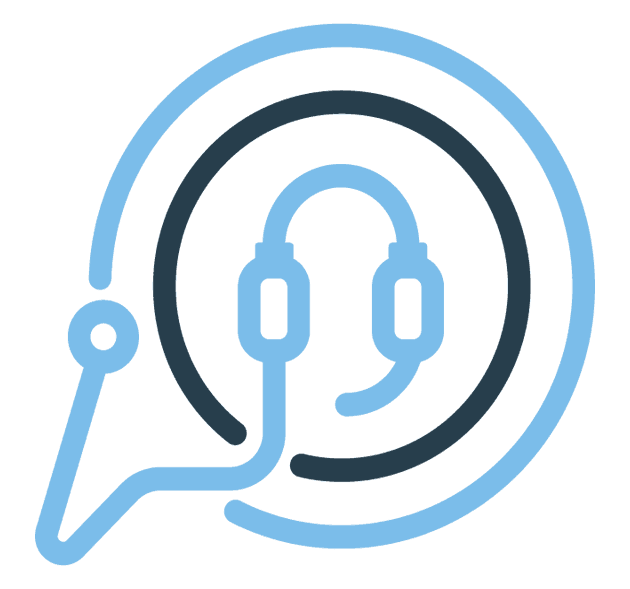Call centers and answering services are often used interchangeably, but there is a significant difference between the two. So, what’s the difference? Let’s compare the applications and features of both to clarify the distinction.
What is a Call Center?
A call center can handle both inbound and outbound calls on behalf of a commercial entity. As secondary tasks, a call center may answer questions that the caller might have, reply to text messages, web chat, and emails, take orders and process payments over the phone, make cold calls, qualify leads and more. These services are often done according to a script which has been written or authorized by the client company.
Focus
Call centers are geared toward business functions; common applications can include:
- Product sales,
- Cold calling,
- Customer support,
- Tech support,
- Data collection,
- Fielding complaints,
- Orders and shipping, and
- Loyalty programs.
Script
The script is another key distinguishing factor between an answering service and a call center. Call centers work with a script-prompted system which gives agents complex scripts to follow. Agents are able to provide a limited amount of information to end clients, with their staff augmentation role limited to the script options provided by the client company. Script-branching is a technique that some call centers offer to guide phone communications through multiple decision points.
Automation
Call centers often use automation to decrease the time requirements for live agents when fielding large call volumes. Voice prompts and digit input are used to direct calls and gather basic caller information before connecting with an agent. This type of automation is effective and efficient for many types of business and customer support call management where there is high call volume, callers can be categorized, and their requests can be satisfied by a call agent. Surprisingly, the use of automation tends to increase the average hold time for customers.
Hold Time
The amount of time that a call center agent puts a customer on hold varies greatly from business to business and day to day. In general, long wait times are viewed as a barrier to access and communication, with a negative impact on customer satisfaction and the reputation of a company. The reasons for longer hold times depend on the number of call center employees, quality of the software and hardware used, and, of course, the call volume. For example, customers may be asked to wait while the agent refers to a supervisor on how to handle a request, while handling another call, or verifying information.
What is an Answering Service?
An answering service is a third-party company that is responsible for receiving incoming calls on behalf of a business, the forwarding calls and relaying messages as needed. Answering services may also provide other services such as scheduling, dispatching, alerts, answering questions, and inputting data.
Focus
Answering services are intended to be complementary to in-office staff, working as staff augmentation. It is a way to outsource routine, administrative tasks in order to increase productivity. Common applications include:
- Overflow call management,
- Virtual receptionist services,
- Personalized response protocols – such as call forwarding, on-call notifications,
- Call triage and prioritization,
- Dispatch,
- Data input and updating customer records,
- Relaying messages,
- Appointment scheduling,
- Responding to administrative requests.
Script
Answering services are unscripted communications. The live phone agents are on the receiving end, and their response to calls depends on the needs of the caller and directives established by the client company. Agents are trained to relay messages, forward calls, send notifications to on-call staff, and dispatch according to the client company’s preferences.
Automation
Answering services specialize in providing immediately available receptionists. For some business structures, this works to improve the client company’s overall customer efficiency by clarifying the reason for the call upfront.
Answering services don’t use customer-facing automation and voice prompts, but they do employ automation on the backend to increase efficiency. To assist agents, automation quickly connects live agents to information in CRMs and record systems, for example. Real-time access to the right data, significantly improves overall customer satisfaction.
Hold Time
Answering services aim to respond to callers without putting them on hold before they speak with a live agent. The goal is to pick up customer calls in a more efficient manner than the client company was able to do with on-site receptionists. Industry standards for answering services follow the “three ring” rule of not keeping callers waiting more than 18-20 seconds.
Increasing Reliance on Call Center Outsourcing in Healthcare
In recent years, the healthcare industry has witnessed a significant shift toward call center outsourcing. This trend can be attributed to the numerous advantages it offers. One of the main factors contributing to the increasing reliance on outsourcing is its greater cost efficiency. By outsourcing medical call center services, healthcare organizations can leverage the resources and expertise of an outsourcing provider without maintaining extensive in-house infrastructure, equipment, and personnel. This leads to substantial cost savings while maintaining high-quality services for their patients.
Another advantage of outsourcing is the enhanced patient satisfaction it enables. Healthcare organizations gain access to customer service specialists who deliver a consistent and professional experience. Skilled healthcare call center agents can handle a diverse range of patient inquiries, ensuring service quality is maintained, ultimately leading to improved patient satisfaction. Additionally, call center outsourcing allows healthcare organizations to offer round-the-clock service, catering to patients’ varying needs and schedules. This 24/7 availability fosters a stronger relationship with patients and ensures timely assistance when it’s needed the most.
The scalability and flexibility provided by medical call center outsourcing is also significant factor driving its popularity. Healthcare organizations can scale their services quickly, effectively, and economically to handle an influx of patient calls or expand services to cover additional communication channels. Outsourcing also grants healthcare organizations access to advanced technology and expertise without additional investment or management burdens. These providers invest in sophisticated technology and tools and offer specialized industry experience and well-trained staff.
Moreover, outsourcing call center services enable healthcare organizations to focus on their core competencies by redirecting resources and time toward more mission-critical tasks such as patient care, clinical operations, and research. Furthermore, outsourcing contributes to streamlined data management, as reputable call center providers often utilize state-of-the-art data management systems that better collect, analyze, and share patient information. This enhanced data management drives informed decision-making processes and better patient experiences. In conclusion, the healthcare industry’s increasing reliance on call center outsourcing is expected to persist as it contributes to the optimization of healthcare operations and addresses the financial and operational challenges faced by healthcare organizations.
How To Get Started with Call Center Outsourcing
As healthcare organizations recognize the benefits of outsourcing, one area to consider is call center services. Outsourcing call centers allows healthcare companies to save on costs and enhance the overall patient experience. This section will discuss how to start outsourcing your call center services in the healthcare field.
- Identify Your Call Center Needs
Begin by outlining the specific call center services your organization needs. These could include appointment scheduling, handling patient inquiries, prescription refill requests, billing support, and follow-up calls. Determine which tasks can be outsourced and which must remain in-house. - Research Potential Providers
Look for call center providers specializing in healthcare services, and understand the industry’s unique challenges. Consider factors like experience in the healthcare sector, knowledge of healthcare regulations, and data security capabilities when evaluating potential providers. - Evaluate Pricing Models
Different call center providers may have distinct pricing models such as per-call, per-minute, or per-agent. Analyze these models to determine the most cost-effective one for your organization while still meeting your call center requirements. - Assess Infrastructure and Technology
Since call center outsourcing involves working with remote teams, ensure that your chosen provider has robust technology and reliable infrastructure to facilitate seamless communication. Evaluate their ability to handle your preferred communication channels, like phone, text messages, email, and chat. - Request Client References and Testimonials
Before signing a contract, ask your potential providers for references and testimonials from their clients in the healthcare industry. Reach out to these clients for feedback on the provider’s performance, responsiveness, and adaptability to specific healthcare needs. - Ensure Compliance and Data Security
Data security and compliance with healthcare regulations should be a top priority when outsourcing call center services. Verify that your chosen provider follows stringent data protection protocols and is compliant with healthcare-related regulations such as HIPAA. - Develop a Detailed Service Level Agreement (SLA)
Create a thorough SLA outlining service expectations, performance metrics, response times, and escalation procedures. This document should be mutually agreed upon before beginning the outsourcing process. - Plan a Seamless Transition Process
When outsourcing call center services, it is essential to have a transition plan in place to ensure minimal disruptions in patient care and organizational workflow. Work closely with your chosen provider to create a smooth onboarding process for the existing staff, and establish regular communication channels to facilitate collaboration.
By following these steps in choosing a reliable call center outsourcing provider, healthcare organizations can effectively manage administrative tasks, improve patient experience, and save on operating costs.
Why Answering Services Are a Better Fit for Healthcare
Healthcare is a unique industry because patients don’t want to be treated like consumers. The human factor and desire for empathy is fundamental to successful patient care. This is why answering services provide the better solution for hospitals, doctors’ offices, home care and hospice. Answering services deliver a reliable balance between personal attention for patients and leveraging the brute-force of automated computer technology for accuracy, efficiency, and traceability.
When you work with a service provider, like PatientCalls, that is dedicated to the medical field, your healthcare organization benefits from:
- Data entry and appointments that are synched directly with your practice’s EMR.
- Agents who are trained to respect patient confidentiality and comply with HIPAA security and privacy regulations.
- Bilingual agents.
- Insurance verification and teletriage.
- Call management according to your staff’s preferences.
- The ability to modify directive plans as needed.
- Live agents who work virtually alongside internal admin staff, augmenting staff activities, relieving the workload, and increasing overall efficiency.
- Patients answered by a live agent right away to sustain a sense of caring and community.
- Detailed and secure communication logs.
- Secure communications, including encrypted text messaging capabilities, for better staff coordination.
Related article: Patients #1 Compliant – Not Being Able to Get Ahold of their Doctor.
Contact PatientCalls directly through the quote request form to learn more about our dedicated healthcare answering services.







